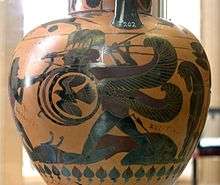Erulus
- "Erylus" redirects here. This name can also refer to a genus of cylindrical bark beetles.
In Vergil's Aeneid, Erulus is a king of Praeneste. At birth, he was given three souls (animae) by his mother, the goddess Feronia, who also tripled his ability to defend himself by giving him three sets of arms.
Vergil tells his story through the Arcadian king Evander, founder of Pallantium, who allies with the Trojan immigrants led by Aeneas. Evander regrets that the frailty of old age keeps him from fighting at Aeneas's side, and reminisces about the warrior deeds of his youth:

| “ | If only Jupiter would give me back The past years and the man I was, when I Cut down the front rank by Praeneste wall And won the fight and burned the piles of shields! I had dispatched to Hell[1] with this right hand King Erulus, to whom Feronia, His mother, gave three lives at birth—a thing To chill the blood—three sets of arms to fight with, So that he had to be brought down three times. Yet this hand took his lives that day, took all, And each time took his arms …[2] |
” |
No other literary source mentions Erulus; he may be Vergil's pure invention, based on the mythological figure Geryon,[3] or given that his mother's cult is represented only sparsely in literary sources, he may belong to an archaic tradition to which no other reference survives.[4] Some scholars have seen Erulus as an influence on Spenser's conception of Triamond's three-fold life in The Faerie Queene.[5]
References
- ↑ "Hell" translates Tartarus.
- ↑ Vergil, Aeneid 8.560–567, as translated by Robert Fitzgerald.
- ↑ P.T. Eden, A Commentary on Virgil: Aeneid VII (Brill, 1975), p. 155 online.
- ↑ Nicholas Horsfall, Virgil, Aeneid 11: A Commentary (Brill, 2003), p. 445 online.
- ↑ Alastair Fowler, Spenser and the Numbers of Time (Routledge, 1964), p. 28, note 1 online.